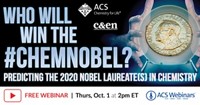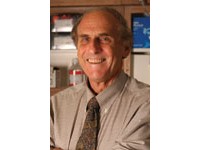Advertisement
Grab your lab coat. Let's get started
Welcome!
Welcome!
Create an account below to get 6 C&EN articles per month, receive newsletters and more - all free.
It seems this is your first time logging in online. Please enter the following information to continue.
As an ACS member you automatically get access to this site. All we need is few more details to create your reading experience.
Not you? Sign in with a different account.
Not you? Sign in with a different account.
ERROR 1
ERROR 1
ERROR 2
ERROR 2
ERROR 2
ERROR 2
ERROR 2
Password and Confirm password must match.
If you have an ACS member number, please enter it here so we can link this account to your membership. (optional)
ERROR 2
ACS values your privacy. By submitting your information, you are gaining access to C&EN and subscribing to our weekly newsletter. We use the information you provide to make your reading experience better, and we will never sell your data to third party members.
Biological Chemistry
Nobel Prize In Physiology Or Medicine
Discoverers of HIV and cancer-causing human papillomaviruses get the nod
by Sarah Everts
October 6, 2008

This year's Nobel Prize in Physiology or Medicine goes to three Europeans for research linking human papillomaviruses to cancer and for the discovery of HIV, the virus that causes AIDS.

Half of the $1.4 million prize goes to 72-year-old German virologist Harald zur Hausen of the German Cancer Research Centre, in Heidelberg, "for his discovery of human papillomaviruses causing cervical cancer."
"I knew that I was a candidate for the prize, but when it actually happened, it was a big surprise," zur Hausen told C&EN. In the 1970s, zur Hausen "went against current dogma," according to the Nobel Assembly, when he proposed that the human papillomaviruses (HPVs) play a role in cervical cancer.
"Zur Hausen's talents and insights put his group at the forefront of an endeavor that three decades later" has produced a vaccine against HPVs that cause cervical and other cancers, says William Bonnez, a medical researcher at the University of Rochester School of Medicine and one of the inventors of an HPV vaccine to prevent cervical cancer.
Two French virologists will split the other half of the prize for their discovery of HIV. They are 76-year-old Luc Montagnier of the World Foundation for AIDS Research & Prevention and 61-year-old Françoise Barré-Sinoussi of the Pasteur Institute, in Paris.
Montagnier and Barré-Sinoussi detected activity of the retroviral enzyme reverse transcriptase in samples from infected patients and made important early observations of how the virus affects the immune system, the Nobel Assembly noted.
"The significance of their achievements should be viewed in the context of a global ubiquitous epidemic affecting close to 1% of the population," according to the Nobel Assembly.
The announcement that Montagnier and Barré-Sinoussi will share the prize, but not University of Maryland researcher Robert Gallo, formerly of the U.S. National Cancer Institute, has raised some eyebrows and ignited the blogosphere.
"A Nobel Prize for HIV is long overdue," says John M. Coffin, an HIV researcher at Tufts University. "But I would have thought Gallo would have been added to the list for his role in laying the groundwork for discovering HIV, in particular for developing ways of growing cells to assay for the virus."
Gallo released a statement congratulating the winners and noting that he "was gratified to read Dr. Montagnier's kind statement expressing that I was equally deserving." Gallo and Montagnier were involved in a harsh public debate over who discovered HIV. In the late 1980s, the debate came to a head over ownership of a patent for the HIV blood test. Former president Ronald Reagan and former french prime minister Jacques Chirac got involved, and finally, the two researchers agreed to split the patent and any subsequent income equally.
- Nobel Prize In Chemistry
- Japanese, two Americans tapped for green fluorescent protein.
- Nobel Prize In Physics
- Three honored for developing fundamental theory that explains why matter persists.
- Nobel Prize In Physiology Or Medicine
- Discoverers of HIV and cancer-causing human papillomaviruses get the nod.
- C&ENtral Science: The Chemistry Nobel … And A Rap To Celebrate It
- C&ENtral Science: The Chemistry Nobel … And A Video To Celebrate It






Join the conversation
Contact the reporter
Submit a Letter to the Editor for publication
Engage with us on Twitter